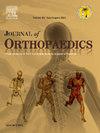术前使用PHQ-2进行抑郁筛查与ACL重建后较差的预后相关
IF 1.5
Q3 ORTHOPEDICS
引用次数: 0
摘要
目的探讨术前抑郁筛查阳性对前交叉韧带重建术(ACLR)后患者预后的影响。方法回顾性分析2020年5月至2022年9月间术前PHQ-2评分的原发性ACLR患者。年龄大于13岁且至少随访6个月的患者纳入分析。患者分为PHQ(+) (PHQ-2≥2)或PHQ2(-) (PHQ-2 <;2).收集人口统计学数据、术前和术后患者报告结果信息系统(PROMIS) -身体功能(PF)和疼痛干扰(PI)评分、患者可接受症状状态(PASS)、手术临床结果和并发症并进行比较。分类变量和连续变量分别采用卡方检验和独立t检验。结果共分析127例患者,其中PHQ2(+) 32例,PHQ2(−)95例。PHQ2(+)组在术前(6.5% vs. 25.3%, p = 0.03)、术后9个月(47.4% vs. 72.4%, p = 0.05)和术后12个月(42.9% vs. 79.5%, p = 0.009)对PASS的回答为“是”的比例较低。PHQ2(+)在术前、6个月和9个月时的promise - pi评分较差。PHQ2(+)组在术前、6个月、6个月和12个月时的promise - pf均较差。PHQ2(+)组术前9个月和12个月的IKDC评分较差。抑郁症筛查阳性的患者术后并发症发生率(34.4%比9.5%,p = 0.001)和再手术率(21.9%比4.2%;p = 0.002)。结论简单的术前检查,如PHQ-2,对ACLR术后患者的预后有一定的预测价值。证据水平ii -回顾性队列研究。本文章由计算机程序翻译,如有差异,请以英文原文为准。
Preoperative depression screening using PHQ-2 is associated with worse outcomes after ACL reconstruction
Purpose
To determine how screening positive for depression preoperatively can affect patient reported outcomes after anterior cruciate ligament reconstruction (ACLR).
Methods
Primary ACLR patients between May 2020–September 2022 with a PHQ-2 score prior to their surgery were retrospectively reviewed. Patients older than 13 years of age and with minimum 6-months of follow-up were included for analysis. Patients were categorized as PHQ(+) (PHQ-2 ≥2) or PHQ2(−) (PHQ-2 < 2). Demographics, preoperative and postoperative Patient Reported Outcome Information System (PROMIS) -Physical Function (PF) and Pain Interference (PI) scores, Patient Acceptable Symptomatic State (PASS), surgical clinical outcomes, and complications were collected and compared. Chi-square tests and independent t-tests were used for categorical and continuous variables, respectively.
Results
A total of 127 patients were analyzed, with 32 PHQ2(+) and 95 PHQ2(−). The PHQ2(+) group had a lower proportion responding “yes” to PASS preoperatively (6.5 % vs. 25.3 %, p = 0.03), at 9 months (47.4 % vs. 72.4 %, p = 0.05), and 12 months postoperatively (42.9 % vs 79.5 %, p = 0.009). PHQ2(+) reported worse PROMIS-PI scores preoperatively, at 6 months, and at 9 months. The PHQ2(+) group reported worse PROMIS-PF preoperatively, at 6 months, at and 12 months. The PHQ2(+) group had worse IKDC scores preoperatively at 9 months and at 12 months. Those screening positive for depression also demonstrated a higher incidence of postoperative complications (34.4 % vs. 9.5 %, p = 0.001) and reoperation rates (21.9 % vs. 4.2 %; p = 0.002).
Conclusion
A brief preoperative survey, such as the PHQ-2, can provide prognostic value for patient outcomes after ACLR.
Level of evidence
III-Retrospective cohort study.
求助全文
通过发布文献求助,成功后即可免费获取论文全文。
去求助
来源期刊

Journal of orthopaedics
ORTHOPEDICS-
CiteScore
3.50
自引率
6.70%
发文量
202
审稿时长
56 days
期刊介绍:
Journal of Orthopaedics aims to be a leading journal in orthopaedics and contribute towards the improvement of quality of orthopedic health care. The journal publishes original research work and review articles related to different aspects of orthopaedics including Arthroplasty, Arthroscopy, Sports Medicine, Trauma, Spine and Spinal deformities, Pediatric orthopaedics, limb reconstruction procedures, hand surgery, and orthopaedic oncology. It also publishes articles on continuing education, health-related information, case reports and letters to the editor. It is requested to note that the journal has an international readership and all submissions should be aimed at specifying something about the setting in which the work was conducted. Authors must also provide any specific reasons for the research and also provide an elaborate description of the results.
 求助内容:
求助内容: 应助结果提醒方式:
应助结果提醒方式:


